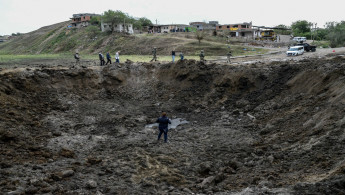Sixteen missing after PKK blast in southeast Turkey
Turkish authorities were on Monday working to confirm the fate of at least 12 civilians who are missing and feared dead after a huge blast last week blamed on Kurdish rebels in the southeast of the country, reports and official sources said.
The mainly Kurdish region of Diyarbakir was on Thursday night rocked by a massive explosion that was also felt in the city centre and was later said to have been caused by Kurdistan Workers Party (PKK) militants loading explosives onto a truck.
Four people, all PKK militants, were confirmed by the authorities to have been killed in the blast, which the interior ministry said was caused by explosives detonating prematurely.
But the local governor's office later confirmed media reports that 12 citizens were still missing after the immense blast, which left a gigantic crater in the ground.
The Dogan news agency reported Monday that some 15 tonnes of explosives had detonated in the incident and that 13 local residents were still missing.
It said the authorities had conducted three investigations of the scene, collecting body parts from a half kilometre area which were sent to Istanbul for analysis and DNA identification.
An AFP correspondent who visited the scene on Friday saw body parts still strewn around the area and was told by villagers that up to 16 people were missing.
In a statement, the PKK also said the explosion was accidental, claiming the vehicle exploded when anti-PKK villagers opened fire on the truck and hit its fuses.
The group said the explosives were meant to be transferred to another location and not detonated. It offered condolences to the families of the bystanders who died but said it was not to blame for the loss of life.
Turkey has been waging an offensive against the PKK after the collapse in 2015 of a two-year ceasefire declared by the group.
Hundreds of members of the Turkish security forces have been killed in attacks since then although civilian deaths in the conflict have rarely been confirmed.
Over 40,000 people have been killed since the PKK took up arms in 1984 demanding a homeland for Turkey's biggest minority. Since then, the group has pared back its demands to focus on cultural rights and a measure of autonomy.





 Follow the Middle East's top stories in English at The New Arab on Google News
Follow the Middle East's top stories in English at The New Arab on Google News


